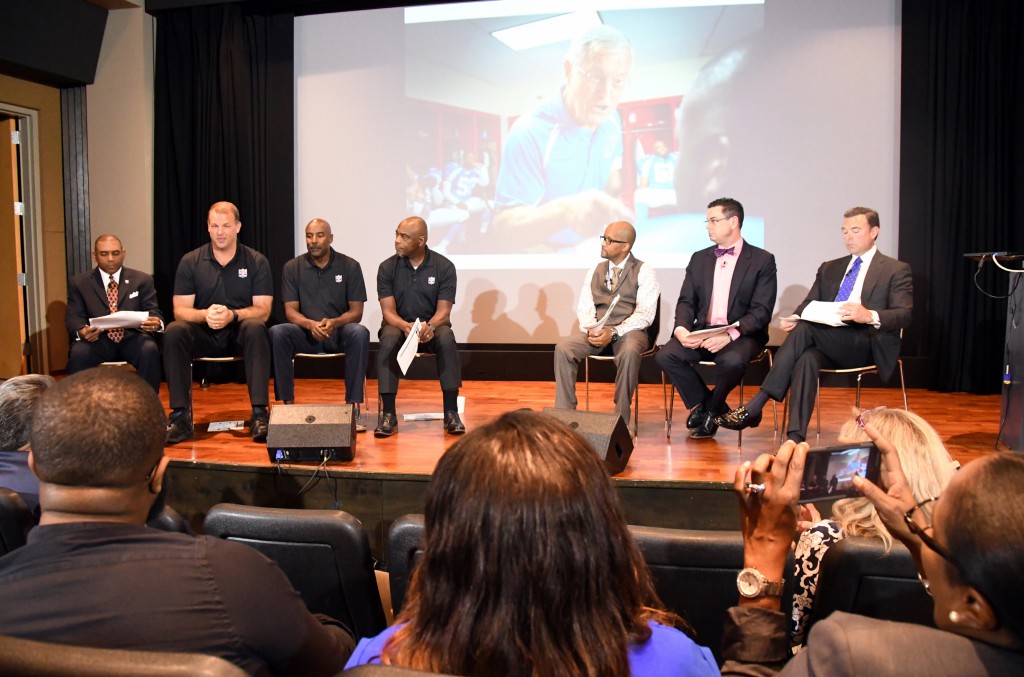NFL Films hosts Prostate Cancer Awareness Month event, which encourages men to get checked for the disease, which is easily treatable if detected early.

A few years back, Carl Baylor was experiencing back pain, and figured he had a slipped disc or sciatica.
But a doctor saw something wrong, and ordered a prostate-specific antigen test.
“I didn’t know what a PSA was,” he said.
As it turned out, Baylor had cancer.
“I really was shocked at first,” he said.
A medical warehouse supervisor from Hamilton, New Jersey, Baylor received care at Cancer Treatment Centers of America’s location at 1331 E. Wyoming Ave.
Baylor, who turned 50 on Wednesday, underwent chemotherapy, but didn’t get sick or lose weight. He also benefited from spiritual care, diet, supplements, massage therapy and acupuncture
“They’re great people there,” he said.
Today, he’s on hormone therapy and his PSA is stable.
Recently, he joined a few former pro football stars at NFL Films in Mount Laurel, New Jersey for a news conference to kick off Prostate Cancer Awareness Month.
The event was hosted by former NFL defensive back Beasley Reese. Former Eagles offensive lineman and congressman Jon Runyan and Eagles radio analyst and former wide receiver Mike Quick were also in attendance.
Also joining the panel were NFL Alumni Association chief financial officer Elvis Gooden, LabCorp CEO Gary Huff and Dr. Sean Cavanaugh, of Cancer Treatment Centers of America’s hospital in Georgia.
Similar events were held at CTCA’s other facilities in Georgia, Illinois, Arizona and Oklahoma, featuring former NFL players D.J. Shockley, Dan Hampton, Simeon Rice, Nick Lowery, Steve Largent and Ed “Too Tall” Jones.

CTCA and the NFL Alumni are directing people to ProstatePepTalk.com
There, visitors can watch videos of former NFL coaches Dick Vermeil, Herm Edwards and Bill Cowher explaining the importance of early detection. Edwards is a former coach of the Kansas City Chiefs, whose owner, Lamar Hunt, died of prostate cancer.
Also on the website is information about free or discounted PSA screenings. Through Oct. 15, eligible men 40 and older can sign up for a screening on the website. The screenings are offered at LabCorp’s 1,750 locations.
The test is a simple, noninvasive analysis that measures PSA levels in the blood. Because PSA levels are elevated in men with prostate cancer, the test is a common early screening tool for diagnosing the disease.
Registrations are also being taken at healthtestingcenters.com
“I encourage everyone to get screened,” Huff said.
Prostate cancer is the most common cancer among men. According to the American Cancer Society, one in seven men in the United States will be diagnosed with prostate cancer. In 2017, there will be an estimated 161,360 new cases, along with 26,730 deaths.
Baylor didn’t think he’d be among the statistics.
“Get yourself checked out,” he said. “It can save your life.”
Runyan acknowledged that talking about prostate cancer can be uncomfortable, adding that it is usually up to the women in men’s lives to convince them to get tested.
Cavanaugh agreed, based on his experience.
“Most men don’t know where the prostate gland is,” he said.
For those who do, a digital rectal examination is often the most uncomfortable part of a physical.
“Nobody likes that exam,” the doctor said.
Cavanaugh said all men at about age 40, particularly those with a family history of prostate cancer, need to be tested.
“Finding the disease early is the key,” he said. ••






